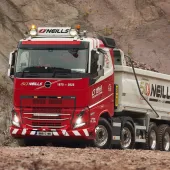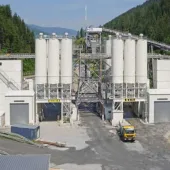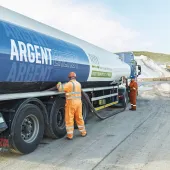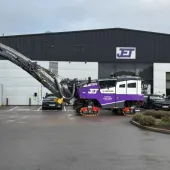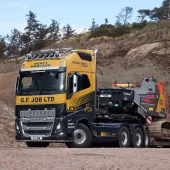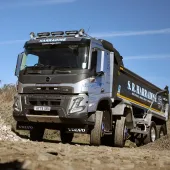Better Bulk Transport from Clugston Distribution
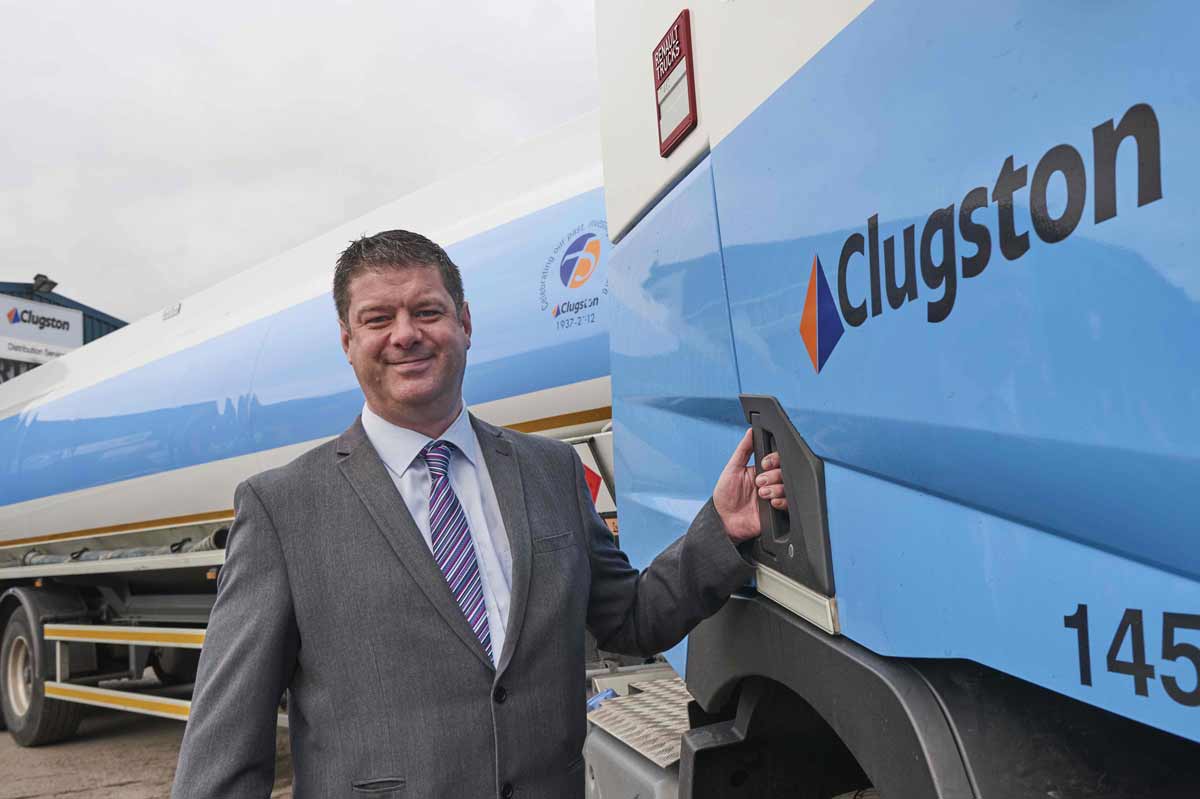
First published in the November 2019 issue of Quarry Management as Better Bulk Transport
Delivering quality solutions for the quarrying sector
By Tim Doggett, distribution director, Clugston Distribution
The handling and distribution of bulk materials in the quarrying sector presents quarry managers and logistics companies with a raft of challenges, chief among them being ensuring speed and efficiency throughout the supply chain.
Transporting bulk aggregates and cementitious materials brings its own set of unique and complex challenges. Distribution is one of the most crucial, yet cost-intensive processes in a modern mining or quarrying operation. In addition to fuel and labour, there is also the cost of upkeep and maintenance of vehicles. All this combined means the way in which quarrying companies manage their logistic operations could ultimately be the difference between eroding profits or lower operational costs.
While safety has to be of paramount importance, those who distribute bulk aggregates and cementitious materials within the quarrying sector also face an increased expectation to deliver operations that are faster, more flexible and considerably more efficient.
To ensure product integrity and guarantee production line processes run smoothly, the timely delivery of materials is essential. Speed is of critical importance when responding to the changing demands of the modern marketplace, whilst flexibility is another beneficial attribute. It speeds up reaction times, makes it easier to meet short lead times and deal with unforeseen changes or fluctuating volumes, and ensures that when demand requires, the correct vehicles and equipment needed for particular materials are available.
Of equal value is efficiency. The ability to transport materials via optimized delivery routes allows companies to reduce costs, ensure product integrity and make sure that deliveries arrive on time to keep processes going undisrupted, whilst at the same time decreasing the harmful damage transport causes to the environment.
Spoilage
Much less common, but equally important, is the prevention of issues such as contamination or spoilage along the production line. Although rather atypical of the mining or quarrying sector, preventative and reactive measures must still be considered should such incidents occur.
If serious issues such as combustion, contamination or spoilage do transpire, it is essential that expeditious procedures are in place to deal with them effectively.
This is especially important when it comes to the distribution of bulk aggregates and cementitious materials. When contamination happens here, urgent corrective action is needed to stop it from spreading along the production line and causing major disruption.
To minimize risk, companies have to be meticulous in their care of bulk materials during handling, storage and transportation. This is one of the most critical ways to prevent safety hazards occurring, as dirt or debris getting into the product or putting the wrong type of material into a silo are all potential causes of combustion, contamination and spoilage.
While risk can be diminished, cases of contamination can still occur. Should this happen, it is vital to have an effective contingency plan so that the swift evacuation and appropriate handling of materials can take place as soon as any potential contamination is discovered. In this way, companies can limit any undesirable consequences, such as product loss, damage to reputation and the potentially significant costs of downtime.
New technologies and forward-thinking strategies
In order to tackle today’s challenges head-on, the leading logistics providers have adopted a more forward-thinking approach, one which incorporates both groundbreaking distribution strategies and the use of pioneering technologies.
One important innovation of this forward-thinking approach is the use of multifunctional tractor units. These tractors allow companies to haul different types of bulk tankers and trailers, including those needed for the transport of aggregates and cementitious materials. Using these units increases the capability of the logistics company to achieve fast and efficient deliveries, while also extending the versatility of its entire fleet. The outcome for customers is a service that is both faster and more flexible.
A further and equally advantageous development is the use of specialist tankers. With bottom discharge tanks, evacuation tanks, pressurized vacuum tanks and tipping tanks being made widely available for customers, today’s advanced logistics companies are rapidly expanding their fleets with a much broader range of capacities and configurations. The outcome for customers in the quarrying sector is that these enhanced fleets are far more able to meet their varying needs and are much better equipped to cope with ‘just in time’ demand.
The continual development of technology has also led to progress in logistics. The adoption of the latest solutions has been a driving factor for improvements in flexibility, efficiency, compliance and safety. For example, the installation of advanced telematics and transport-management technology on all vehicles allows the entire fleet and, consequently, every consignment, to be tracked and traced end to end.
In addition, the collection of data provides accurate scheduling and forecasting, letting customers find out where their products are during transit, whilst reassuring them that they are being transported by the quickest, most fuel-efficient and cost-effective routes. Add to the mix the use of weight-saving initiatives that help maximize payloads and it becomes apparent what advantages modern technology bestows on both logistics companies and customers in the quarrying industry.
Vehicle maintenance
While technology has had a measurable effect on improving driving efficiency throughout the bulk aggregates and cementitious materials supply chain, it is not the only factor to make a significant contribution. Also of high importance is commercial vehicle maintenance, something that the leading logistics companies have not overlooked.
Today, the major distribution companies are investing heavily in their own maintenance centres, installing state-of-the-art facilities and employing fully qualified teams of technicians to ensure their entire fleet is operating at its optimum. These teams are trained to work on a wide range of commercial vehicle brands as well as on specialist vehicles, such as extendable or trombone trailers and pressurized powder tankers.
As a consequence of regular maintenance, vehicle downtime is kept to a minimum and breakdowns are significantly reduced. If a breakdown does occur, vehicle parts are kept in stock and this allows the maintenance teams to carry out necessary repairs at the utmost speed.
Moreover, the vehicles on the road are primed for driving efficiency and are optimized for better performance. These improvements ensure that customers face less in-transit disruption and that the costs of shipping are minimized.
As the prospect of a ‘no-deal’ Brexit becomes an increasing possibility, driving efficiency throughout the supply chain will become more necessary than ever – especially for multinational quarrying operations. As a result, aspects such as vehicle maintenance and repair processes and establishing strategic supply chain locations have become more essential as companies bid to mitigate further the possible downtime and disruption in the wake of perceived delays at British ports.
What this means is that many distribution providers, including Clugston Distribution, are continuing to invest in infrastructure, from new trucks and trailers to maintenance facilities and strategic depots across the UK, Europe and globally, to better meet the demands of the modern quarrying industry.
In summary, the adoption of modern distribution strategies and new technologies, together with the development of in-house commercial vehicle maintenance, has enhanced logistics companies’ operations in several important ways. They have made services swifter, more flexible, more efficient and more reliable, whilst making the distribution of bulk materials safer. Crucially, when incidents of contamination arise, they provide the quickest and most effective solutions to tackle them.
Clugston’s Bulk Powder Division has more than 50 years’ experience in a variety of bulk powder products and operations. For more information, visit: www.clugston.co.uk/logistics
- Subscribe to Quarry Management, the monthly journal for the mineral products industry, to read articles before they appear on Agg-Net.com


